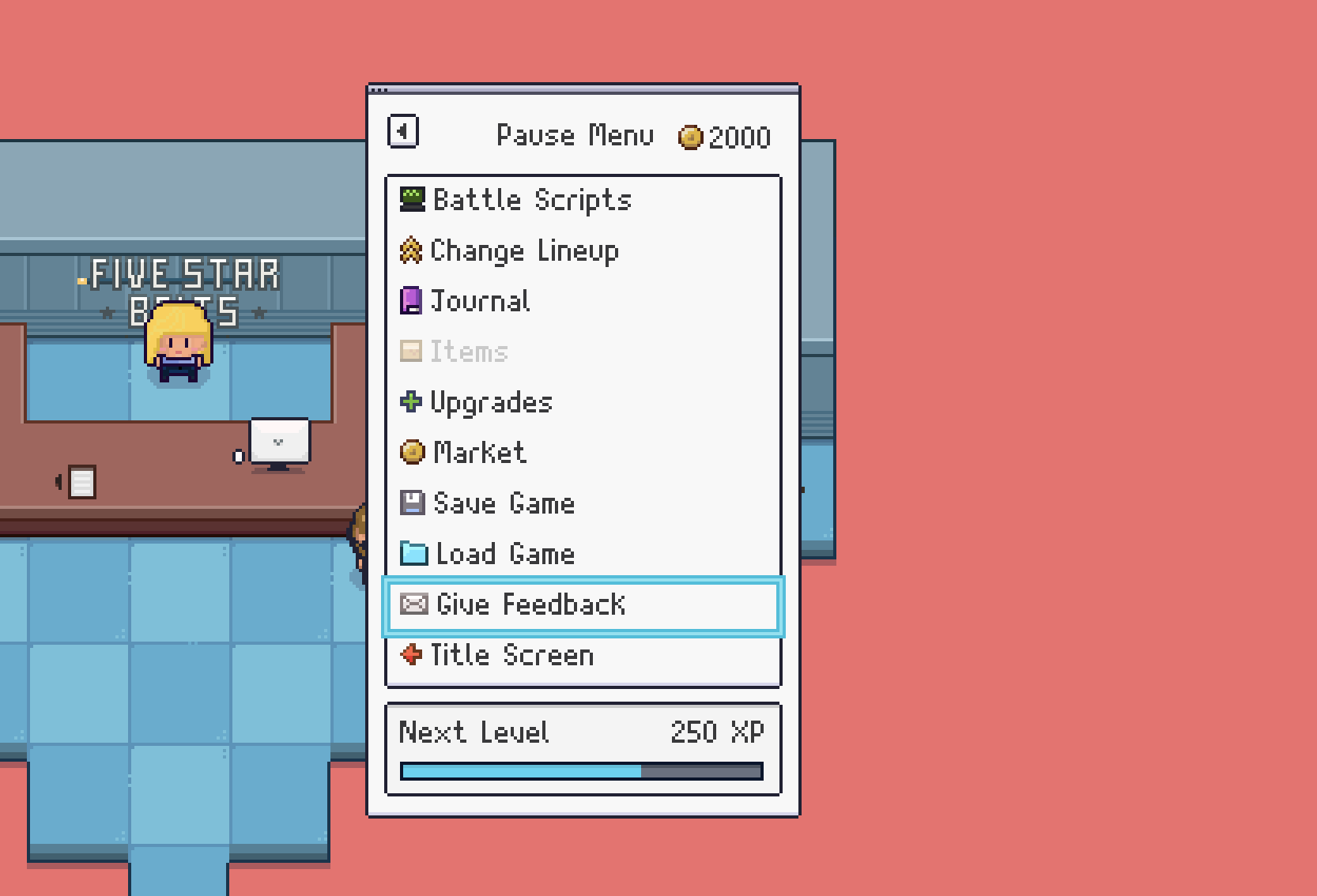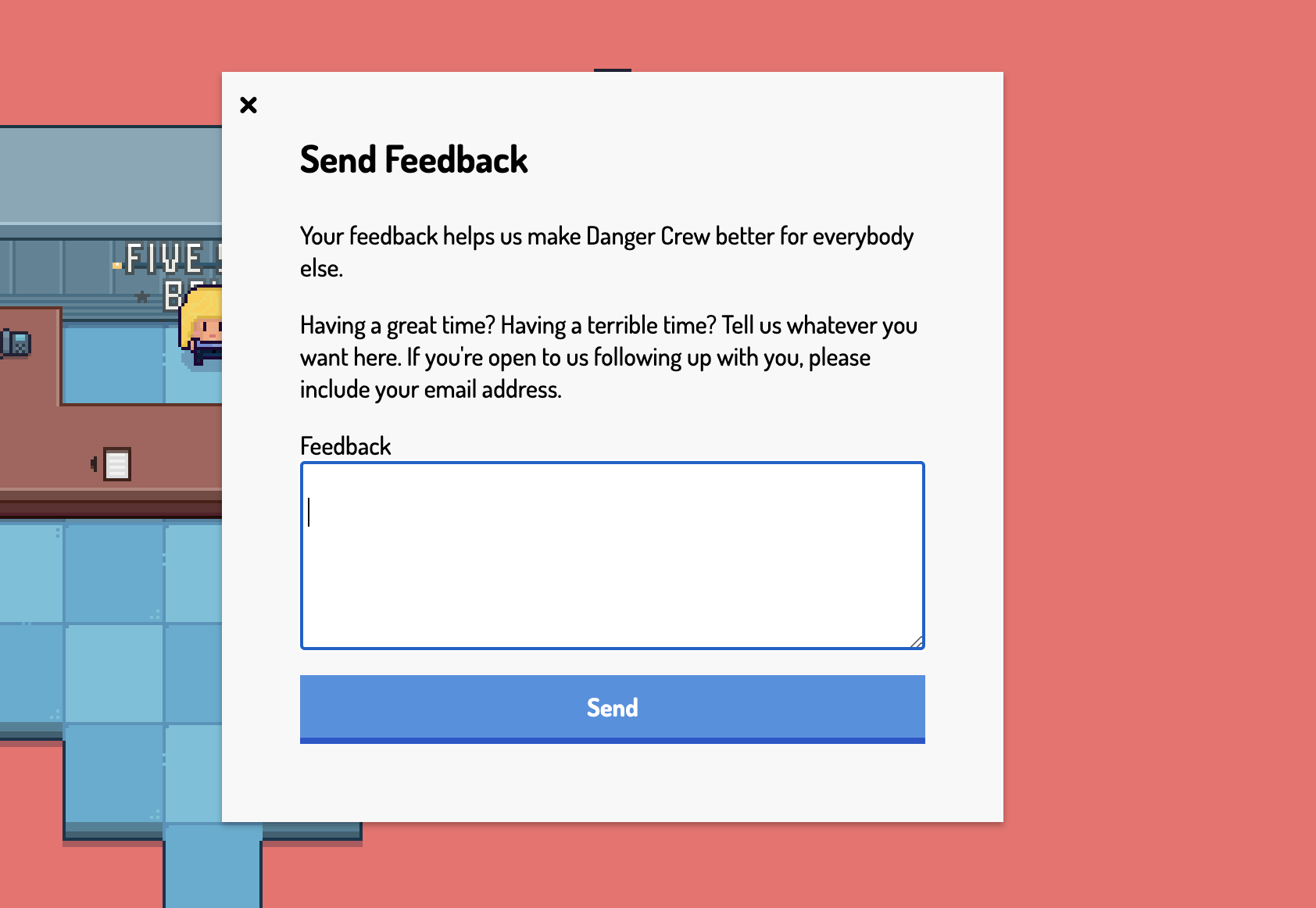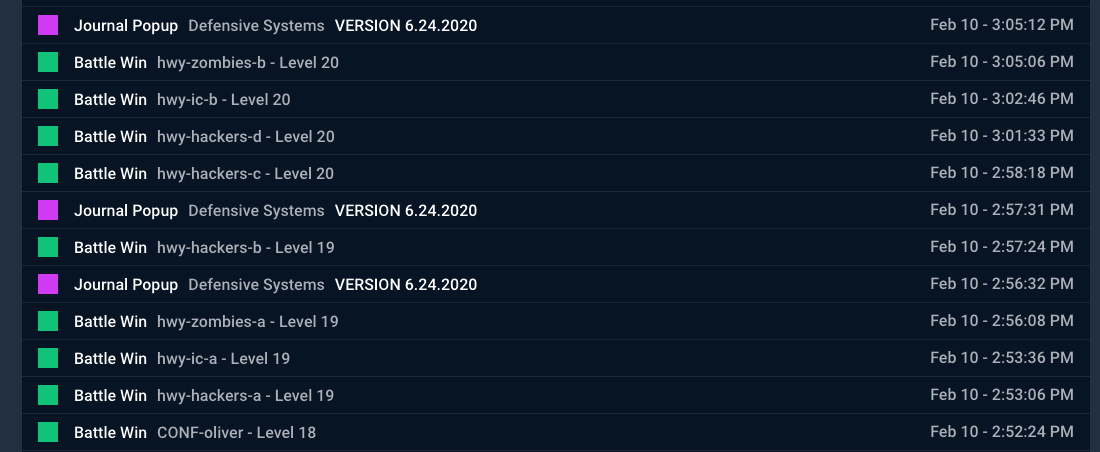Ways to get Feedback on your game dev project
You’ve been working on your game for weeks, months, maybe even years, pouring your heart and soul into it. When you’re “heads down” in the weeds of development, it’s sometimes easy to lose track of the bigger picture question: will people even like this game? Especially when you are working on the game alone.
Getting feedback from other people is a critical tool that can help fill in those gaps and help you improve the experience of your game. But how do you go about getting feedback? Here are some of the tips and tricks I’ve been using.
Way 1: Put a feedback form directly inside your game.
Make it quick and easy for people to jot thoughts down as they play. Let them capture thoughts right there in the moment.
We tried this in Danger Crew by adding a Feedback option in the game’s Pause Menu. Players could pause the game and type whatever they want into the form’s text input. The comments were sent directly to our web-server. After a few people had filled out the form, we were able to look through the messages and find patterns in what people were saying. We referenced the patterns when creating patch updates for the game.


I prefer to provide a single open input for people to type whatever they want, rather than having hyper-specific questions in the form. Open-ended questions allow people to reveal things that otherwise would be completely off your radar to ask about. Questions that are too specific may be limiting.
The form in Danger Crew also recorded the current area of the game the player was in. Knowing their location gave us context to exactly where the player was when they wrote the comment. If the players were lost or frustrated, it was clear to us exactly which part of the game they were talking about.
I learned this trick from a GDC talk, by the way. In this presentation, a UX Researcher at Bungie discusses the process used for gathering user feedback on the first Destiny game. It’s a great watch and also speaks to the value of contextualizing feedback as it comes in.
If you include a form in your game, it’s a good idea to offer an optional email address field so you can keep in contact with people who leave comments. I failed to include an email address field inside Danger Crew’s form, and I regret it all the time. People would leave helpful feedback, but I had no way to ask follow-up questions or thank them.
Way 2: Add quantitative analytics to your game
People often say one thing but do another. Raw facts about their behavior may be the bits of information you need to make decisions when designing something.
If you work on websites, you may be familiar with libraries like Google Analytics that track page hits and activity. Consider adding something like this to your game’s code to record when specific events happen.
We had a battle tracker in Danger Crew that helped us know which battles players were consistently winning and losing. It helped us tweak the difficulty of battles.

Some analytics ideas:
- Track player progression over time, like how long it takes to complete a quest.
- If your game has an open world, track the order in which they complete events. You may find trends that influence future iterations.
- Track if players are discovering the secrets you put in. Maybe hidden items you’ve tucked away or bonus rooms.
If you’re building a web-based game, you could potentially use an off-the-shelf analytics tool, like Google Analytics. If you’re using a more traditional game engine, you may need to build something yourself - anything that shoots player activity to a web server. Remember to keep it all anonymous.
Way 3: You need to watch people play the game.
But not in an awkward way.
The best way we received feedback for Danger Crew was by watching streamers play the game on Twitch.
I had a few leftover promotional Steam keys, so I reached out to some streamer friends to see if they’d want to play our game on stream. I was expecting it to be a marketing thing, but it ended up being a fantastic user research test.
We watched a handful of streamers play the game and immediately noticed areas where people were getting caught up, like when UI was unclear or frustrating. It was all available to us by just watching a recording of them play.
Streamers are typically in their own space, at their own computer, comfortable and hanging out with their friends while streaming the game they are playing. You can see their screen and observe natural reactions to events as they occur. It’s a great way to get natural feedback. It’s way less awkward than lingering over somebody’s shoulder as they play your game.
A good way to find potential streamers is by browsing Twitch looking for people who play games like yours. Danger Crew was inspired by Super Mario RPG, Earthbound, and Pokemon, so I started with those games. If the streamer has contact information listed, you can reach out to them and pitch your game demo. (If they don’t have contact information listed, do not contact them.) I’ve found many of them stoked to show something new on their stream.
This process may introduce you to people who genuinely love and understand the genre of game you are making. Their feedback will go a long way in patching improvements and refining ideas.
Way 4: Show your game to other game developers
These are people also walking the walk of making a game, who understand the trudge and struggles you’ve been through to get to this point.
It’s highly likely that an experienced gamedev has been in your exact shoes before. They may be able to fill in any knowledge gaps you aren’t thinking about or reveal other random gotchas that you’ll run into down the road.
They may be able to mine-sweep potential road bumps that you’ll run into as you finish your game. Like, technical quirks about your game that you’re going to run into while getting on Steam. Missing features you should definitely have that people will be asking for after launch, that kind of thing.
Our Discord Community has a lot of fellow game developers who would be willing to check out your project and give you feedback. Just ask!
Feedback is just feedback
Remember that you are not obliterating or abandoning the vision for your game by asking for feedback, you’re just opening yourself up to the input of other people to help you make your game better. It’s okay to disagree with somebody’s opinion about your game.
For example, many players wanted us to add multiplayer support to Danger Crew, but we wanted to create a focused, solo story experience. We tried creating a multiplayer demo out of curiosity, and it was fun, but it didn’t fit the game we wanted to make. Here’s an older post about that process
You’ll never please everybody, but do listen to people! Try to understand what they are saying and where they are coming from. Ultimately, it’s your decision to adopt any changes they suggest.
Good luck in your venture for player feedback! Let me know how it goes.
Previous Post